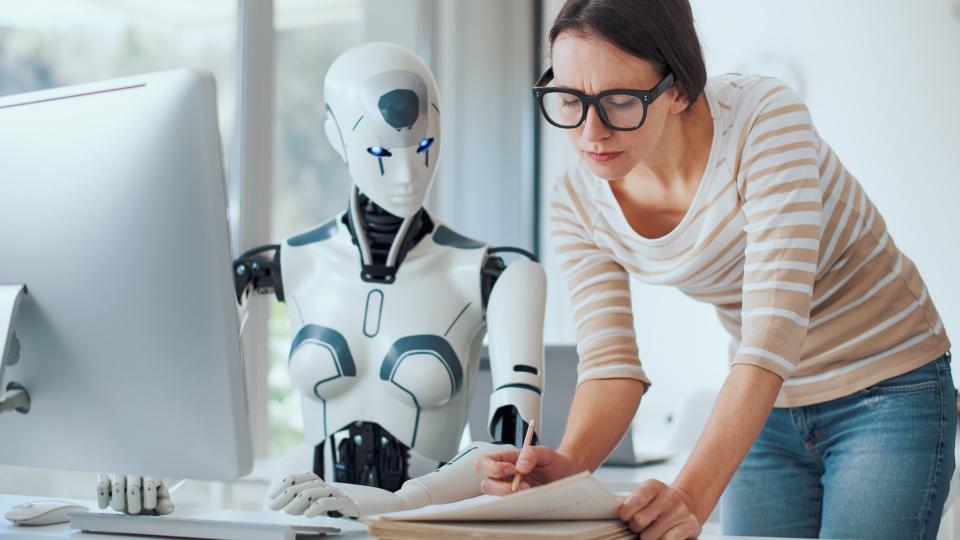Tech Experts Explain That It’s Other Humans (Not AI) That May Replace Your Job — Here’s Why

Artificial intelligence (AI) isn’t new. It’s just evolved into an incredibly sophisticated machine-learning model with extremely useful, real-life applications.
Learn: ChatGPT Suggests 10 Business Ideas That Will Make You $1 Million
Find: Pocket an Extra $400 a Month With This Simple Hack
Savvy users of the new technology have used AI chatbots to do everything from rewriting resumes and creating extensive e-mail marketing campaigns to planning luxurious vacations or producing floor plans for home renovation projects.
With all of these capabilities, it’s natural to think that the technology could replace hundreds of thousands of skilled workers in the years to come. However, if you think the advent of AI marks the end of the human workforce, perhaps you’ll appreciate another perspective.
Like all technology, AI is a tool
Most experts don’t think that AI will create massive amounts of displaced workers. In fact, many tech analysts still see it as a tool still requiring a human touch, thus the need for AI-savvy professionals.
Karim Lakhani is a professor at Harvard Business School who’s been studying AI and machine learning in the workplace for years. He summed up his analysis succinctly: “AI is not going to replace humans, but humans with AI are going to replace humans without AI.” He further explained, “Just as the internet has drastically lowered the cost of information transmission, AI will lower the cost of cognition.”
Generative AI model limitations
For those who worry about losing their jobs to robots or computers, it’s helpful to frame this within the context of it being a tool in the hands of competent human capital. This sentiment is not just a notion. It’s backed by the existence of real limitations and shortcomings that may or may not have an immediate solution.
Related: ChatGPT’s Retirement Planning Advice for Your 50s
Though there are many limitations to the tool’s utility and widespread adoption, here are just a few to think about.
1. Lack of understanding in real-world contexts
Although AI models can efficiently process, analyze and summarize data, there’s the lack of understanding matters like emotional intelligence, ethics and cultural nuance. Chatbots may recommend data-backed methods of choosing the best profession based on a person’s skill set and personality, but they may not recognize the cultural stigma or impracticality associated with occupations like bounty hunting or escort services.
Then, there’s the difficulty of recognizing humor, sarcasm and the peculiarities of the human experience. With this in mind, it’s almost a sure thing that a human touch will be required to review, edit and refine AI outputs.
2. Lack of transparency
Mrinal Manohar of the Forbes Technology Council discussed the “black box” of training data used to support AI logic and outputs. He said, “The lack of transparency in training data poses a major hurdle to engineers trying to understand the how and why behind AI decision-making.”
He further explained that it’s like trying to bake something without the recipe, which ultimately affects the technology’s biases, adding, “Bias and inaccuracy are top concerns for both the general public and private sector, where mistakes from AI can negatively impact bottom lines.”
This is where professional skills like fact-checking and sophisticated research methods will make a difference. Knowing where the learning models tend to fail and how they should be remedied will be an essential skill in the AI economy.
3. Complex problem-solving is still an issue
Whether trying to work through complicated math problems or providing recommendations for the complexities of societal ills like homelessness or poverty, AI solutions can still fall short. Most complex problems require multiple steps and a multidisciplinary approach. In other words, you have to know a lot of stuff about a lot of things to produce anything near a viable solution.
AI models synthesize information based on pattern recognition and large datasets. As a result, AI-based decision-making tends to process well-defined problems better — not abstract nebulous ones.
With this in mind, we can see that human intervention is required to provide logic, order, datasets and prompts for complex problems. These foundational resources help AI models arrive at useful conclusions that make sense for the real world.
Human intellect and judgment are still required
The limitations of AI still require significant human involvement. The U.S. National Institute of Standards and Technology, a government agency working on the trustworthy and responsible use of AI, stated that its office “relies heavily on stakeholder input” to accomplish this goal. If AI is going to get better, it will inevitably require the brain trust of human individuals to get the job done.
Though the technology has proved incredibly useful in the last year. This doesn’t mean we should all prepare for massive layoffs or record levels of displaced workers, as there’s still a lot lacking regarding the competence and reliability of AI and AI-base tools.
It simply means that labor forces everywhere should prepare themselves for the new AI economy. It’s not perfect, but it’s here, and it’s not going away.
More From GOBankingRates
This article originally appeared on GOBankingRates.com: Tech Experts Explain That It’s Other Humans (Not AI) That May Replace Your Job — Here’s Why

 Yahoo Finance
Yahoo Finance 